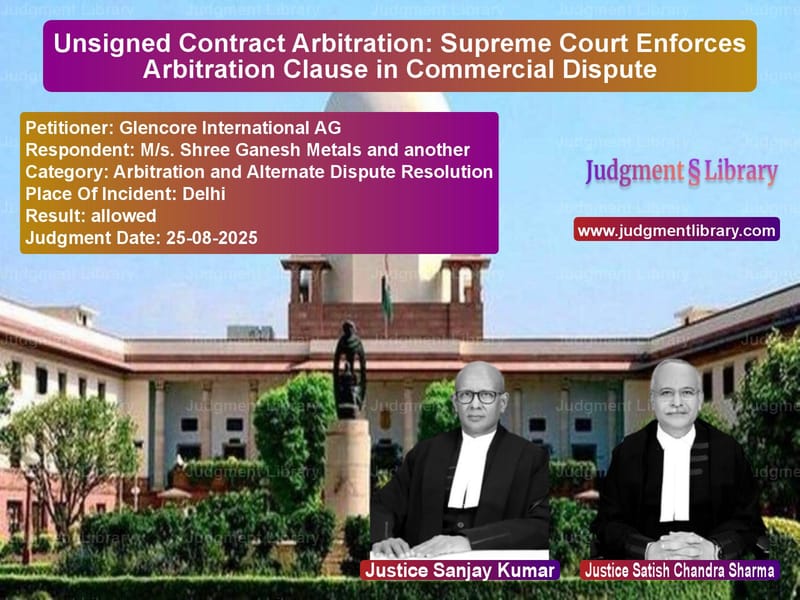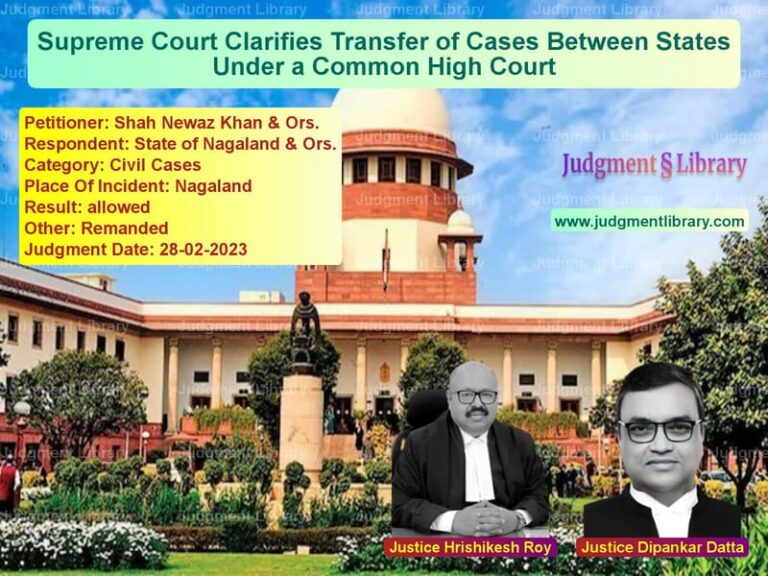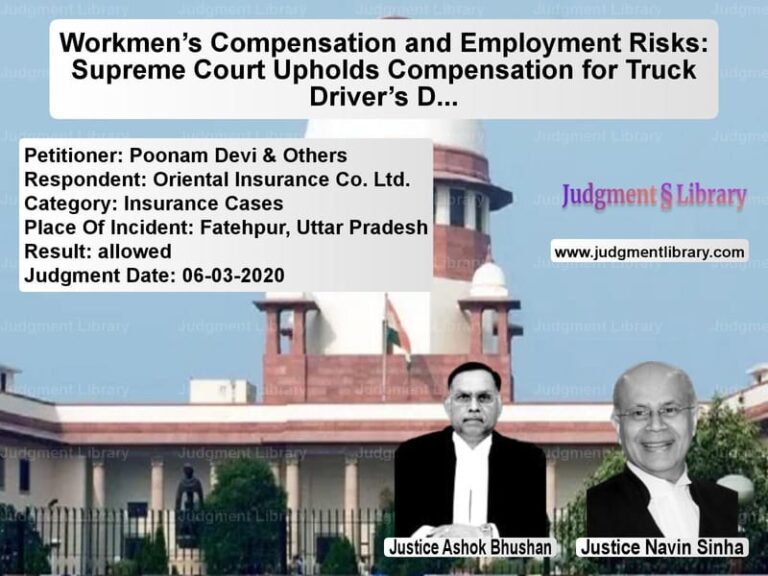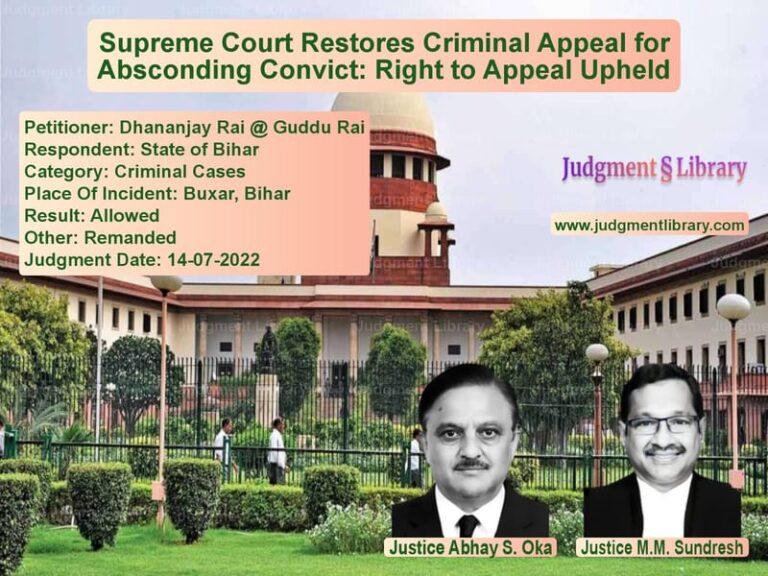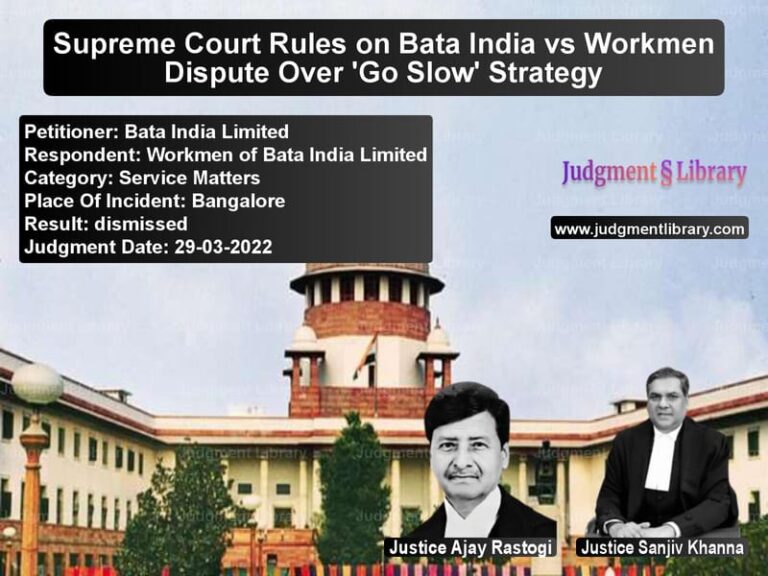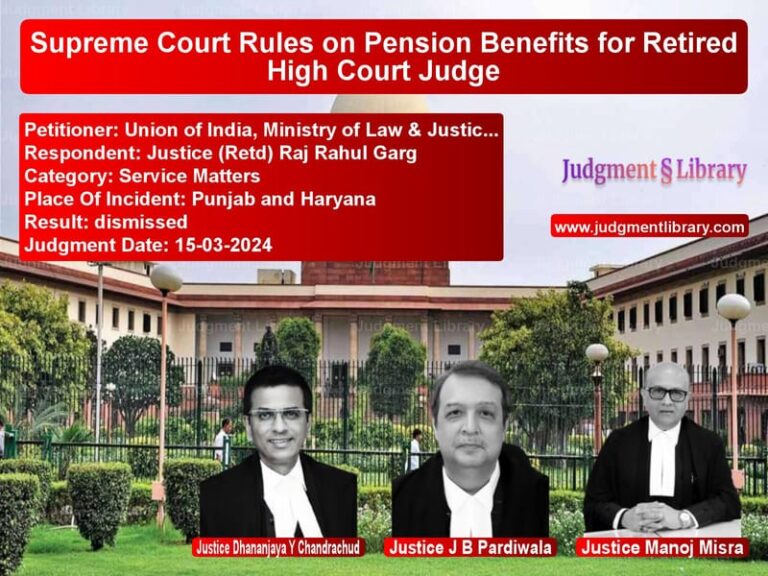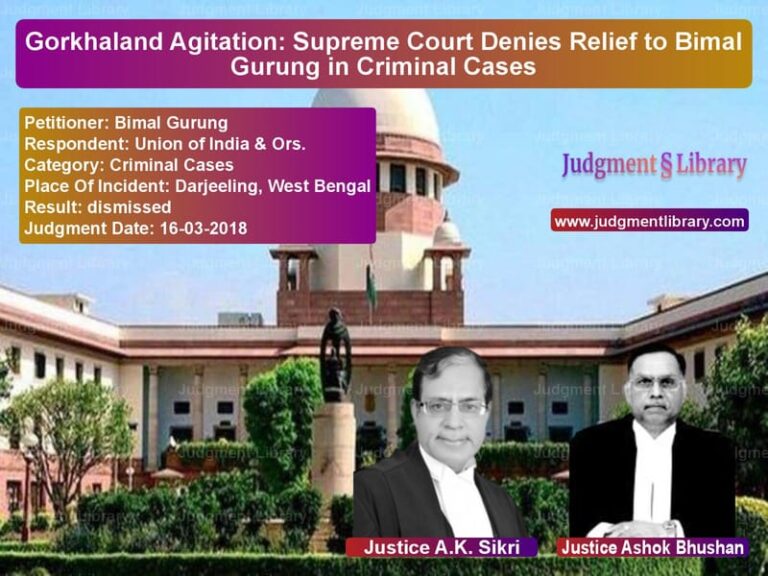Unsigned Contract Arbitration: Supreme Court Enforces Arbitration Clause in Commercial Dispute
In a landmark judgment that clarifies the legal position on arbitration agreements in unsigned commercial contracts, the Supreme Court of India has delivered a significant verdict that emphasizes the importance of parties’ conduct over formal signatures. The case involved Glencore International AG, a Swiss commodity trading giant, and Shree Ganesh Metals, an Indian proprietorship concern, locked in a legal battle over whether their commercial relationship was governed by an arbitration clause despite one party not signing the formal contract document.
The dispute centered around Contract No. 061-16-12115-S dated March 11, 2016, for the supply of 6,000 metric tons of zinc metal. While Glencore had signed the contract and sent it to Shree Ganesh Metals for execution, the Indian company never returned the signed document. However, what followed was a series of actions that would become central to the legal dispute – Shree Ganesh Metals accepted delivery of 2,000 metric tons of zinc metal, facilitated the issuance of standby letters of credit specifically referencing the contract number, and engaged in correspondence that acknowledged the contractual relationship.
The Contractual Background
The business relationship between the parties wasn’t new. They had previously entered into four contracts between 2011 and 2012, all containing arbitration clauses stating that any disputes would be referred to arbitration under the Rules of the London Court of International Arbitration with London as the seat of arbitration. The 2016 contract negotiations began with an email from Glencore on March 10, 2016, proposing terms for the new supply agreement. Shree Ganesh Metals responded on March 11, 2016, with what would become a crucial communication: “We confirm the same terms as said just one thing that provisional price of both, either LC or Invoice, will be average of last 5 (five) LME days.”
This email response indicated acceptance of all terms except for one modification regarding the pricing mechanism. Glencore accepted this modification and proceeded to prepare Contract No. 061-16-12115-S, which incorporated the changed pricing term as requested by Shree Ganesh Metals. The contract contained a comprehensive arbitration clause in Clause 32.2, which stated: “Any dispute arising out of or in connection with this contract, including any question regarding its existence, validity or termination, shall be referred to and finally resolved by arbitration under the Rules of the London Court of International Arbitration, which Rules are deemed to be incorporated by reference into this clause. The seat, or legal place, of arbitration shall be London.”
The Legal Battle Begins
Despite not signing the contract, Shree Ganesh Metals acted upon it by accepting deliveries and arranging for financial instruments. When disputes arose regarding outstanding payments and future deliveries, Shree Ganesh Metals filed a civil suit before the Delhi High Court seeking to declare the invocation of standby letters of credit as null and void and to recover approximately ₹8 crores from Glencore.
Glencore responded by filing an application under Section 45 of the Arbitration and Conciliation Act, 1996, requesting that the matter be referred to arbitration as per Clause 32.2 of the contract. The core legal question was straightforward: Could an arbitration agreement be enforced when one party had not signed the contract but had clearly acted upon it?
The High Court’s View
The learned Single Judge of the Delhi High Court rejected Glencore’s application, holding that no concluded contract came into existence since Shree Ganesh Metals had not signed the document. The judge observed that “the terms and conditions contained therein were apparently not accepted, signed or stamped by respondent No.1.” Surprisingly, the judge also stated that “there was nothing on record to show that this change in the offer was expressly accepted by the appellant” – despite Contract No. 061-16-12115-S clearly incorporating the very modification requested by Shree Ganesh Metals.
The Division Bench of the Delhi High Court concurred with this view, focusing on whether the arbitration agreement from the 2012 contract would apply to the current disputes rather than addressing the arbitration clause in the 2016 contract that was actually being invoked.
The Supreme Court’s Analysis
The Supreme Court, in a judgment delivered by Justice Sanjay Kumar with Justice Satish Chandra Sharma concurring, took a fundamentally different view of the facts and the law. The Court emphasized that “the Division Bench and the learned Judge of the Delhi High Court lost sight of certain crucial factual aspects which showed that Contract No. 061-16-12115-S was duly accepted and acted upon by respondent No.1. Such actions on its part implied that the arbitration agreement therein also came into effect and bound the parties thereto.”
The Court made several crucial observations about the conduct of the parties that demonstrated acceptance of the contract. Most significantly, “It is an admitted fact that 2,000 metric tons of zinc metal were supplied by the appellant pursuant to Contract No. 061-16-12115-S and not only were 8 invoices raised by the appellant in the context thereof, quoting the said contract number, but respondent No.1 also complied with its obligations under that contract by furnishing two Standby Letters of Credit on 22.04.2016 and 17.11.2016.”
The Court also noted that “even in the course of this email correspondence, respondent No.1 indicated its concurrence with the terms and conditions proposed by the appellant in its email dated 10.03.2016 by way of its reply email dated 11.03.2016, wherein it suggested only one modification.” This modification was duly incorporated into the formal contract, demonstrating that the parties had reached agreement on all material terms.
Legal Principles on Arbitration Agreements
The Supreme Court reiterated well-established legal principles regarding arbitration agreements, noting that “an arbitration agreement can be inferred even from an exchange of letters, including communication through electronic means, which provide a record of the agreement. The mere fact that Contract No. 061-16-12115-S was not signed by respondent No.1 would not obviate from this principle when the conduct of the parties in furtherance of the said contract, clearly manifested respondent No. 1’s acceptance of the terms and conditions contained therein, which would include the arbitration agreement in clause 32.2 thereof.”
The Court relied on its earlier decision in Govind Rubber Limited vs. Louis Dreyfus Commodities Asia Private Limited, where it had observed that “On reading the provisions it can safely be concluded that an arbitration agreement even though in writing need not be signed by the parties if the record of agreement is provided by exchange of letters, telex, telegrams or other means of telecommunication. Section 7(4)(c) provides that there can be an arbitration agreement in the exchange of statements of claims and defence in which the existence of the agreement is alleged by one party and not denied by the other. If it can be prima facie shown that the parties are at ad idem, then the mere fact of one party not signing the agreement cannot absolve him from the liability under the agreement.”
In another significant observation from the Govind Rubber case that the Court quoted, “It is clear that for construing an arbitration agreement, the intention of the parties must be looked into. The materials on record which have been discussed hereinabove make it very clear that the appellant was prima facie acting pursuant to the sale contract issued by the respondent. So, it is not very material whether it was signed by the second respondent or not.”
The Court also referenced Caravel Shipping Services Private Limited vs. Premier Sea Foods Exim Private Limited, where it was affirmed that “an arbitration agreement needs to be in writing though it need not be signed.” The Court emphasized that “the only pre-requisite is that it should be in writing, as pointed out in Section 7(3). This legal principle would hold good equally for an arbitration agreement covered by Sections 44 and 45 of the Act of 1996.”
The Court’s Final Ruling
In its concluding remarks, the Supreme Court stated unequivocally: “In the light of the aforestated settled legal position and given the admitted facts, which unequivocally demonstrate that respondent No.1 signified its consent to the terms spelt out in the appellant’s email dated 10.03.2016 that finally found place in Contract No. 061-16-12115-S which, in turn, was accepted and acted upon by respondent No.1, we are of the considered opinion that the arbitration agreement in clause 32.2 thereof was very much available to the appellant and invocation thereof under Section 45 of the Act of 1996, by way of I.A. No.4550 of 2017 in CS (Comm) No. 154 of 2017, was fully justified and required to be accepted and acted upon by the referral Court.”
The Court allowed the appeal, setting aside the judgments of the Delhi High Court and restoring Glencore’s application for reference to arbitration. The disputes between the parties were directed to be referred to arbitration in accordance with the arbitration clause in the contract.
Implications of the Judgment
This judgment reinforces the pro-arbitration stance of Indian courts and aligns with the international approach to arbitration agreements. It sends a clear message that in commercial relationships, parties cannot benefit from a contract by accepting its benefits while avoiding its obligations, particularly the dispute resolution mechanism. The decision emphasizes that in modern commercial practice, especially with the prevalence of electronic communications, the conduct of parties and their demonstrated intention to be bound by terms matter more than formalistic requirements like signatures on physical documents.
The ruling also highlights the importance of the kompetenz-kompetenz principle, which allows arbitral tribunals to rule on their own jurisdiction, including determining whether a valid arbitration agreement exists. By referring the matter to arbitration rather than allowing the court to make a final determination on the existence of the arbitration agreement, the Supreme Court has reaffirmed this fundamental principle of arbitration law.
For businesses engaged in international trade and commerce, this judgment provides clarity and certainty that arbitration clauses will be enforced when parties have demonstrated through their conduct that they intended to be bound by the terms of their agreement, even if formal execution procedures were not completed. It protects the legitimate expectations of parties who act in good faith and invest resources based on mutually agreed terms, preventing one party from resorting to technicalities to avoid agreed-upon dispute resolution processes.
Petitioner Name: Glencore International AG.Respondent Name: M/s. Shree Ganesh Metals and another.Judgment By: Justice Sanjay Kumar, Justice Satish Chandra Sharma.Place Of Incident: Delhi.Judgment Date: 25-08-2025.Result: allowed.
Don’t miss out on the full details! Download the complete judgment in PDF format below and gain valuable insights instantly!
Download Judgment: glencore-internation-vs-ms.-shree-ganesh-me-supreme-court-of-india-judgment-dated-25-08-2025.pdf
Directly Download Judgment: Directly download this Judgment
See all petitions in International Arbitration
See all petitions in Commercial Arbitration
See all petitions in Arbitration Awards
See all petitions in Enforcement of Awards
See all petitions in Contract Disputes
See all petitions in Judgment by Sanjay Kumar
See all petitions in Judgment by Satish Chandra Sharma
See all petitions in allowed
See all petitions in supreme court of India judgments August 2025
See all petitions in 2025 judgments
See all posts in Arbitration and Alternate Dispute Resolution Category
See all allowed petitions in Arbitration and Alternate Dispute Resolution Category
See all Dismissed petitions in Arbitration and Alternate Dispute Resolution Category
See all partially allowed petitions in Arbitration and Alternate Dispute Resolution Category

